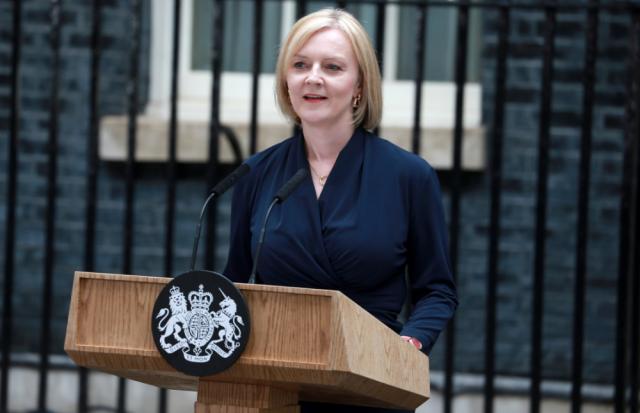
U.K. prime minister Liz Truss on Sept. 6 during her first speech at Downing Street in London, England. (Source: Shutterstock.com)
Learn more about Hart Energy Conferences
Get our latest conference schedules, updates and insights straight to your inbox.
U.K. Prime Minister Liz Truss announced her resignation but said she will remain in the position until a successor has been chosen.
Truss cited her inability to fulfill a mandate from the Conservative Party to lower taxes and deliver higher economic growth to “take advantage of the freedoms of Brexit,” she announced to the media on Oct. 20 just outside the U.K. Office of the Prime Minister on 10 Downing Street.
During her short time in office, Truss was able to launch a couple of initiatives aimed at boosting U.K. oil and gas supply in hopes of bolstering the country’s energy security and lower energy bills. Initiatives included the formal lifting on Sept. 22 of a moratorium on fracking and the launch on Oct. 7 of the U.K.’s first oil and gas exploration licensing round since 2019. The ban on fracking for shale gas in England had also been in place since 2019.
“I recognize though, given the situation, I cannot deliver the mandate on which I was elected by the Conservative Party,” Truss said. “I have therefore spoken to His Majesty The King to notify him that I am resigning as Leader of the Conservative Party.”
As part of the cabinet reshuffle, the U.K. will complete a leadership election in the next week, which “will ensure we remain on a path to deliver our fiscal plans and maintain our country’s economic stability and national security,” Truss said.
Truss assumed the post of U.K. Prime Minister on Sep. 6 and meet the Queen before her passing.
In her first statements Truss said she wanted to pursue three early priorities including getting Britain working again, deal hands-on with the energy crisis caused by Vladimir Putin’s war in Ukraine and making sure U.K. citizens could get needed services from the National Health Service (NHS).
“I thank Prime Minister Liz Truss for her partnership on a range of issues including holding Russia accountable for its war against Ukraine,” U.S. President Joe Biden wrote Oct. 20 in a Twitter post. “We will continue our close cooperation with the U.K. government as we work together to meet the global challenges our nations face.”
The U.S. and U.K. are close allies with a long-standing partnership built on mutual prosperity and security, according to details posted on the U.S. Department of State’s website. The strong ties reflect shared democratic ideals and values and are reinforced through joint efforts on political, security and economic issues.
Recommended Reading
E&P Highlights: April 8, 2024
2024-04-08 - Here’s a roundup of the latest E&P headlines, including new contract awards and a product launch.
E&P Highlights: Feb. 16, 2024
2024-02-19 - From the mobile offshore production unit arriving at the Nong Yao Field offshore Thailand to approval for the Castorone vessel to resume operations, below is a compilation of the latest headlines in the E&P space.
Deepwater Roundup 2024: Offshore Africa
2024-04-02 - Offshore Africa, new projects are progressing, with a number of high-reserve offshore developments being planned in countries not typically known for deepwater activity, such as Phase 2 of the Baleine project on the Ivory Coast.
E&P Highlights: April 1, 2024
2024-04-01 - Here’s a roundup of the latest E&P headlines, including new contract awards.
E&P Highlights: March 15, 2024
2024-03-15 - Here’s a roundup of the latest E&P headlines, including a new discovery and offshore contract awards.






